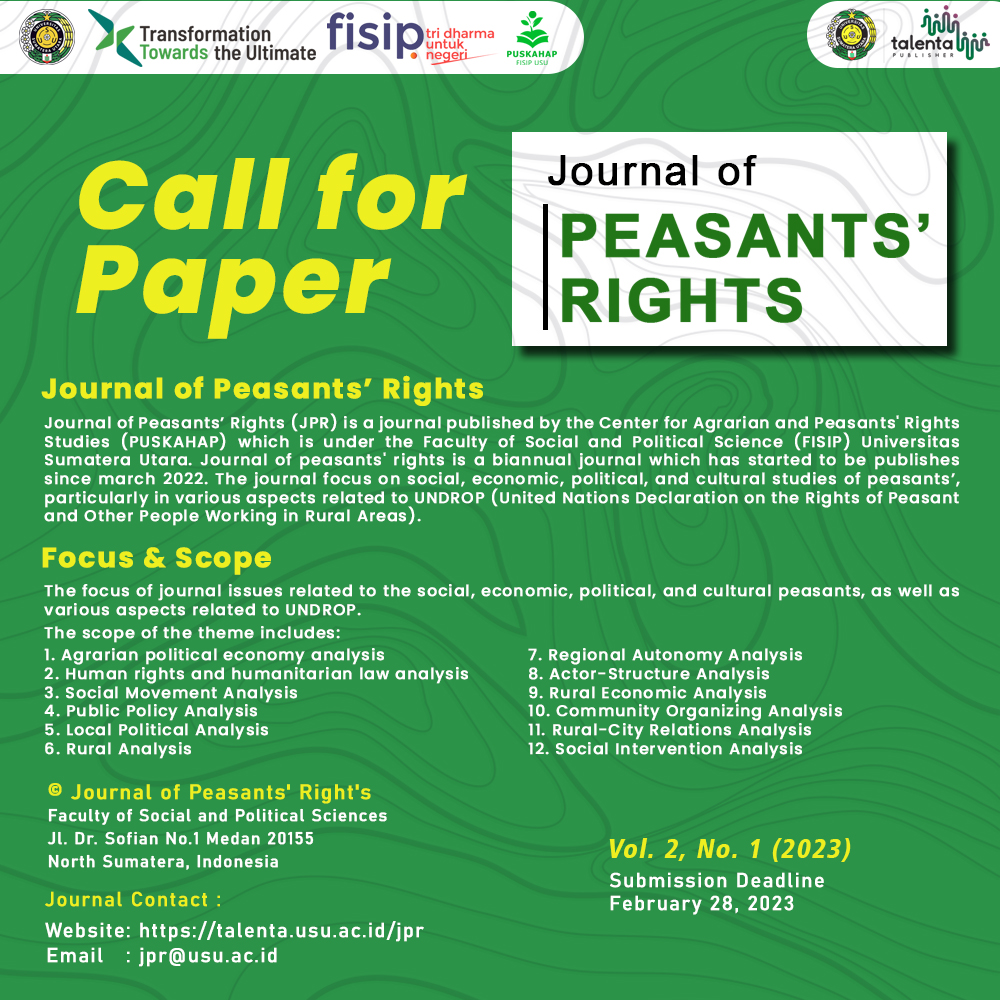A Glance at Agrarian Problems in Jambi
DOI:
https://doi.org/10.32734/jpr.v3i2.19078Keywords:
Jambi, Land, Community, Government, EntrepreneursAbstract
This study explained at a glance problem agrarian in Jambi with​ use approach study qualitative in a way critical and systematic. Some the sources used, namely experience direct researchers, books, journals, and works scientific-scientific others. Research results show problem agrarianism that occurred in Jambi was ongoing problems​ repetitive between Jambi society with businessman as well as government. Events encroachment land often experienced by the Jambi community and not seldom land seized by the company is the only one owned by the Jambi community for continue desire life. Event repetitive this at least based on several factors, namely quality education Jambi society in particular in understand history and law agrarian tend weak. Reality social participate show distribution power no spread across Jambi and the prevailing tendency have is desire life eternal from power economy and politics so there are no agrarian problems in Jambi Once finished completed in a way comprehensive Because the government doesn't either take action.
Downloads
References
Burhanuddin, B., Elsyra, N., Sunaryo, J., Syahwami, S., Rahmi, H., & Hamirul, H. (2024). The Role of Customary Law in Forest Governance and Conservation in Jambi, Indonesia: A Case Study of Makekal Hulu Village within the Customary Territory of the Suku Anak Dalam. Enigma in Cultural, 2(2), 103–116. https://doi.org/10.61996/cultural.v2i2.71
Bourdieu, Pierre. 2019. Language and Symbolic Power. Yogyakarta.
Bush, R. A. B., & Folger, J. P. (2004). The promise of mediation: The transformative approach to conflict. San Francisco: Jossey Bass.
Collins, C.C. (2019). Africapitalism: A roadmap for Africas development. Journal of Advanced Research in Social Sciences and Humanities, 4(2), 51-56. https://doi.org/10.26500/JARSSH-04-2019-0202.
De Dreu, C. K. (2015). Productive conflict: The importance of conflict management and conflict issue. Using conflict in organizations, 9-22. https://doi.org/10.4135/9781446217016.n2
Dwi, S. (2024). Indigenous Peoples and the Constitution: Implementation of Traditional Rights Recognition in Modern Legal Foundations. Journal of Adat Recht, 1(1). https://doi.org/10.62872/8bsvnw62
Fitria, R. Mulyana (2020.). Analysis of Land Disputes and Their Resolution in Jambi. “Journal Legal Science”. 15 (2). 123-140.
Granovsky-Larsen, S. (2018). Between the bullet and the bank: agrarian conflict and access to land in neoliberal Guatemala. The Journal of Peasant Studies, 40(2), 325-350. https://doi.org/10.1080/03066150.2013.777044
Haider, H. (2015). Community-based Approaches to Peacebuilding in Conflict-affected and Fragile Contexts. Governance and Social Development Resource Center. University of Birmingham.
Harsono, Boedi. (2005). Indonesian Agrarian Law: History of Formation Constitution Main Point Agrarian, Contents and Implementation Volume 1. Jakarta: Djambatan.
Jambi Central Statistics Agency. (2022). Biodata Jambi Province.
Lucas, A., & Warren, C. (2018). Land for the people: The state and agrarian conflict in Indonesia.Ohio University Press.
Ministry of Agrarian Affairs and Spatial Planning/ National Land Agency. (2021). Statistics Indonesian Land.
Marsden, William. 2015. The History of Sumatra. Tangerang: Indoliterasi.
Morton & Coleman. (2019). The Handbook of Conflict Resolution. Illinois: Waveland Press Inc.
Mulyana, Slamet. 2019. Sriwijaya. Jakarta: LKIS.
Rahman, A. (2019). Impact of Plantations on Change Environment and Society in Jambi. “Journal Environment and Development”.
Rachman, Noer Fauzi. (2017). Farmers and Rulers: Dynamics Journey Political Indonesian Agrarian. Yogyakarta: Insist Press.
Regulation of the Government of the Republic of Indonesia Number 23 About Forestry Implementation. Decision Letter No 087488 A, 2021.
_____. (2017). Farmers and Rulers: Dynamics Journey Political Agrarian Indonesia. Yogyakarta: Insist Press
_____. (2017). Land Reform and the Indonesian Agrarian Movement. Yogyakarta: Insist Press.
Ritzer, George. (2015). Modern Sociological Theory. Yogyakarta: Pustaka Pelajar.
Riyadi, B. S. (2017). Law of agrarian conflict and resolution effort: A claim dispute of Eigendom Verponding Land. International Journal of Law, 3(3), 80-88.
Rustiadi, E., Barus, B., Iman, L. S., Mulya, S. P., Pravitasari, A. E., & Antony, D. (2017). Land Use and Spatial Policy Conflicts in a Rich-Biodiversity Rain Forest Region: The Case of Jambi Province, Indonesia. Springer Geography, 277–296. https://doi.org/10.1007/978-981-10-5927-8_15
Saragih, Widian, Yandi Syaputra. (2023). The Existence of Indonesian in Three Eras: Dutch Colonialism, Japanese, and The Independence. “Journal of Peasant Right's. 2 (2).
Sugiyono. 2021. Research Methods Qualitative, Quantitative, and R&D. Bandung: Alfabeta.
Syaputra, Yandi, Arkini Sabrina. (2024). Reflection Existence Farmer in Indonesian Historical Stage. “JSI”. 7 (1). 58-68.
Tjosvold, D. (1998). Cooperative and competitive goal approach to conflict: Accomplishments and challenges. Applied Psychology, 47(3), 285–313.
Van Leeuwen, M. (2010). To conform or to confront? CSOs and agrarian conflict in post-conflict Guatemala. Journal of Latin American Studies, 42(1), 91-119. https://doi.org/10.1017/S0022216X10000064.
Wallensteen, Peter. (2016). Understanding Conflict Resolution: War, Peace and the Global System. London: SAGE Publications.
Wiryani, Fifik. 2018. Agrarian Law: Concept and History of Agrarian Law in the Colonial Era until Independence. Malang: Setara Press.






